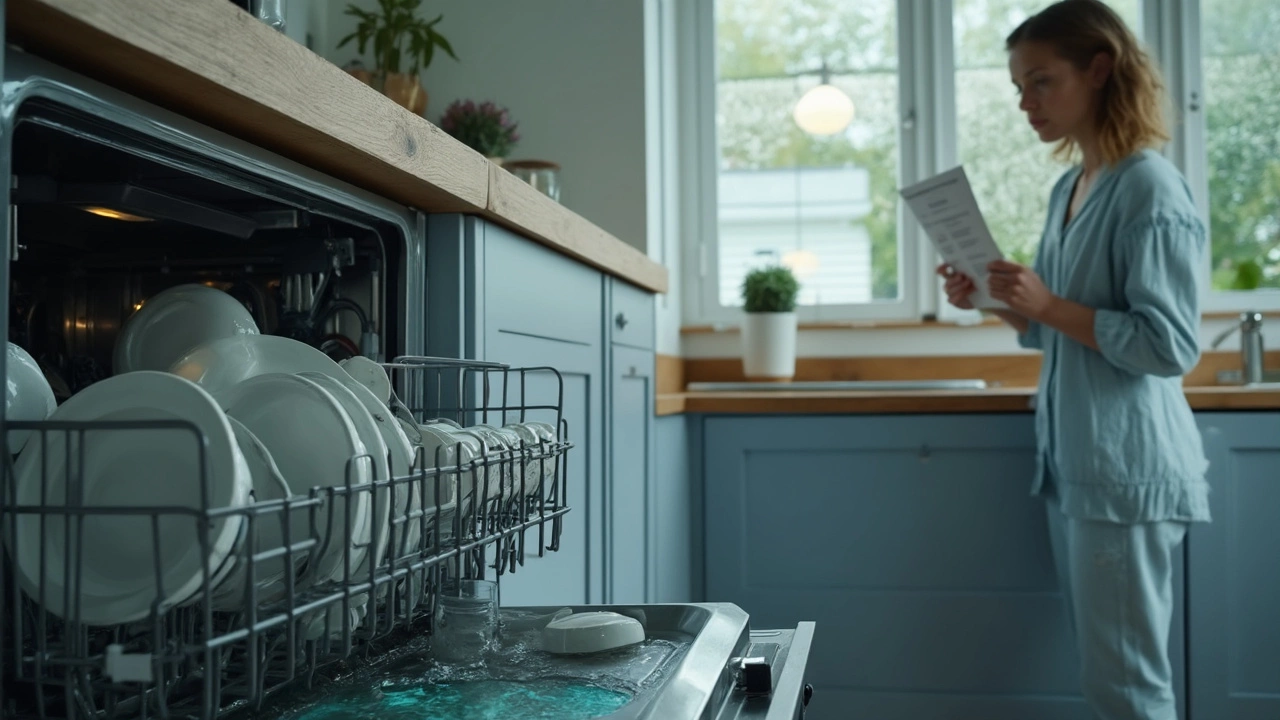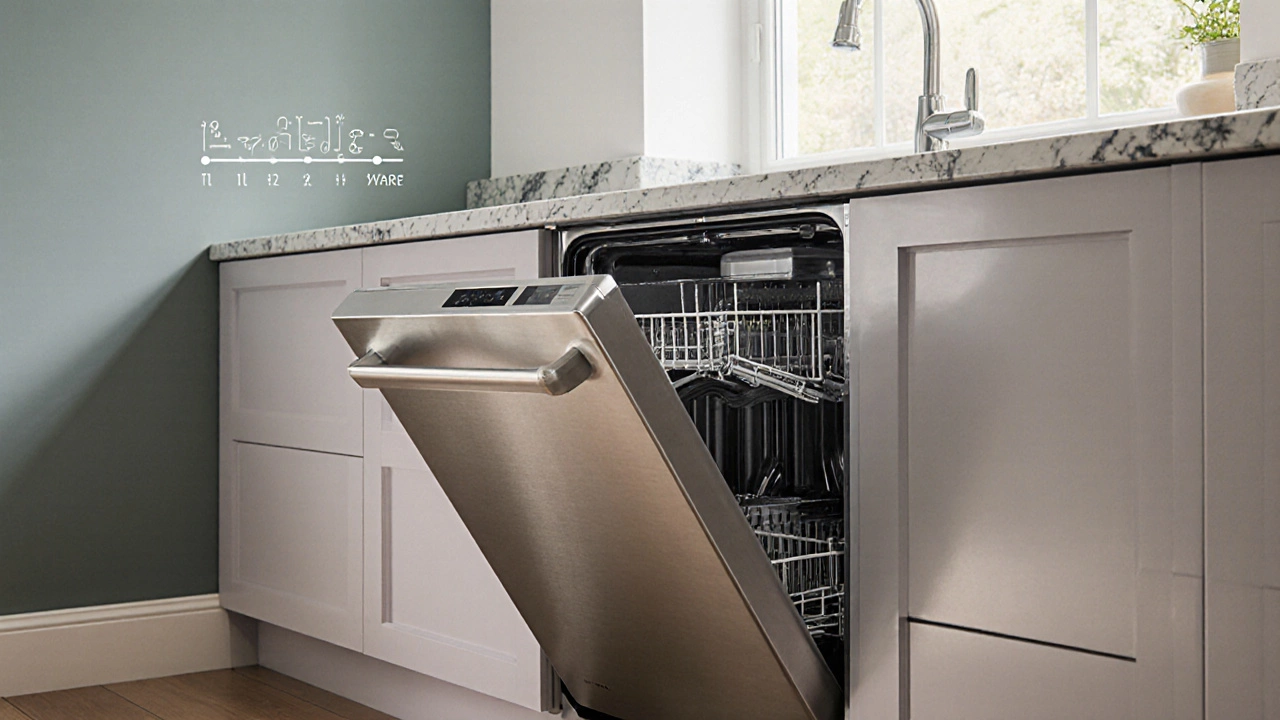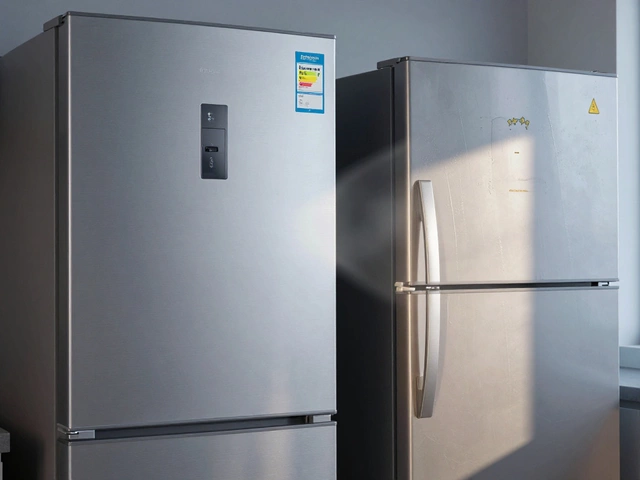Your trusty dishwasher has been there through countless meals, saving you the trouble of laboriously scrubbing away at dirty dishes and pots. But like any appliance, it isn't impervious to wear and tear. Understanding when it might be time to give it a bit of TLC or say goodbye can save you a mountain of hassle and expenses down the line.
Household appliances often exhibit signs before failing altogether, and a keen eye can be the difference between a simple fix and an unexpected total replacement. Whether it's strange noises, unclean dishes, or leaks, each symptom can tell a story. Identifying these signs promptly not only extends the lifespan of the appliance but can also save you from a potential kitchen disaster.
If you're unsure whether it's time to repair or replace, this guide will help navigate the decision-making process, providing insights into the cost-effectiveness of repairs, the red flags that suggest it's time for a replacement, and tips on making the final call with confidence.
- Recognizing Common Dishwasher Problems
- When Repair Makes Sense
- Signs That Replacement Is the Best Option
- Assessing Long-Term Costs and Benefits
- Making the Final Decision: Repair or Replace?
Recognizing Common Dishwasher Problems
Diving into the world of dishwasher troubles can seem daunting at first, but with a bit of guidance, you can become adept at diagnosing some of the most common issues. One of the initial symptoms that many notice is that their dishwashers aren’t cleaning dishes as thoroughly as they used to. This can result from clogged spray arms, an often-overlooked component. Accumulated debris can block the flow of water and leave your plates, bowls, and cutlery disappointingly grimy. Inspecting these parts and ensuring they’re free from blockages can often be a simple and effective solution. Another frequent culprit in cleaning issues is the use of inappropriate dishwasher detergent or loading dishes incorrectly, both of which can heavily impact performance.
Strange or new noises during wash cycles can also raise alarms. Squealing, knocking, or grinding sounds aren’t normal and could indicate worn-out bearings, possibly requiring the attention of a dishwasher repair professional. Identifying the source of these noises can prevent further damage. A dishwasher should hum smoothly, so any deviations from this might signal a need for internal component checks. Leaks are another obvious sign of trouble. They can occur when door seals are compromised or when the appliance isn’t sitting level on your kitchen floor. Such problems not only threaten your appliance but can also damage your floors and cabinets if not addressed promptly.
An often misunderstood issue is poor drainage, which can create a smelly, stagnant pool at the bottom of your kitchen appliances. This might be a symptom of clogged filters or pipes. Regular maintenance of filters by rinsing them under hot water can prevent these blockages. Persistent drainage issues may require a professional inspection to assess and clear any stubborn obstructions. A less common problem is when dishes come out with a white film or rainbow-like spots, often caused by hard water deposits. Using a rinse aid or water softener can alleviate this and leave your dishes sparkling clean.
Finally, one cannot ignore the modern dishwasher’s reliance on electronic controls. Flickering lights, unresponsive buttons, or errors on the digital display can indicate issues with the appliance’s circuit board. According to a recent survey by Appliance Repair Magazine, over 30% of modern dishwasher malfunctions are related to electronic problems, underscoring the potential need for specialized diagnostic assistance when these complications arise.
"A dishwasher is deemed the hero of the kitchen," notes appliance expert Jane Bennett, "but like any hero, it sometimes needs assistance to maintain its peak performance."Staying vigilant about what your appliance may be trying to tell you can minimize interruptions in its service and ensure that it continues to be a reliable member of your household team.
When Repair Makes Sense
Sometimes, opting to repair your dishwasher rather than replacing it is both financially savvy and environmentally friendly. Deciding if repair is the right option involves understanding your appliance, knowing the common issues, and weighing the costs. An important rule of thumb that many appliance experts suggest is the 50-50 rule: if the repair costs are less than half the price of a new dishwasher and it’s less than halfway through its expected lifespan, a repair is often a good idea.
Consider some common occurrences like minor leaks, unusual noises, or dishes not being completely clean. These issues might be due to simple reasons such as a clogged filter or spray arms that can be easily replaced or cleaned. For instance, a filter clogged with food particles can often be removed and cleaned manually, and the parts involved are usually inexpensive. Even a strange noise might result from dishes being loaded improperly rather than a significant mechanical failure.
The environmental impact of our appliances can't be ignored either. Repairing instead of replacing reduces waste and conserves the resources and energy used in manufacturing new products. According to a Greenpeace report, extending the lifespan of household appliances by just one year could save over 4 million tonnes of carbon dioxide emissions in the EU alone.
In addition, consider consulting the warranty or service agreement of your appliance. Sometimes manufacturers offer extended warranties or service programs that can cover parts and labor costs, making repairs even more appealing. For newer models, the chance of having some sort of warranty is higher, which can heavily weigh the decision toward repair.
"It's not just about fixing a machine, it's about prolonging its service to you and the planet," says Emma Johnson, a sustainable living expert at Eco Solutions.
Financially, it's crucial to take into account not only the apparent fix costs but also potential long-term savings. A repaired dishwasher can continue to perform its duties efficiently, maintaining its energy-star rating, and keeping water usage at a minimum. A well-maintained appliance can reduce your utility bills, highlighting the pragmatic sense in choosing a repair avenue when feasible.
In essence, when the issues are minor, or the appliance consists of individual parts that can be cost-effectively repaired or replaced, it makes clear sense to opt for repair. Understanding these dynamics doesn't only apply to when things go wrong but also empowers appliance owners to make informed decisions that align with both their budgetary constraints and eco-friendly values.

Signs That Replacement Is the Best Option
Every appliance, including your beloved dishwasher, has a lifespan. While repairing a faulty dishwasher might seem like the simplest way out, some signs unmistakably point towards replacement being the wiser decision. One of the most apparent indicators is when your dishwasher approaches or exceeds its expected lifespan, typically about 10 years for most models. As appliances age, they become more prone to frequent breakdowns and lose their efficiency, which can lead to increased utility bills. If your dishwasher has given you a decade of service and now requires major repairs like a new motor or pump, investing in a new one might be more cost-effective in the long term.
Another strong indicator that it may be time to replace your dishwasher is if you notice it not performing its primary function well — cleaning the dishes. Streaky, spotted, or grimy dishes after a full cycle could mean that the appliance is losing its cleaning prowess. Although this issue might initially seem fixable, if you've already explored all cleaning remedies and maintenance tips without any improvement, upgrading to a newer model with enhanced technology might be a better option. Modern dishwashers are equipped with advanced cleaning technology, energy-efficient modes, and silent operation, providing you with superior performance and saving on electricity and water in the long run.
According to experts at Consumer Reports, "If your dishwasher is more than eight years old, and the cost of repairs is more than half the price of the new model, replacement would be the more economical choice.”
Those spiraling repair costs are another factor pointing towards replacement. As dishwashers age, securing parts for older models becomes a challenge, driving up repair expenses. If your appliance requires constant attention from repair technicians, those costs can quickly add up. In some cases, manufacturers may no longer support older models, making parts scarce or even obsolete. Getting caught in a cycle of repairs can be frustrating, and a new dishwasher usually comes with ample warranty coverage, offering peace of mind and saving you future headaches.
Lastly, if your current model is no longer meeting the size or feature needs of your household, it may be time to consider an upgrade. Families grow, cook more, and entertain frequently; thus, the dishwasher that perfectly served your needs before might not match your current lifestyle. Models today offer adjustable racks, specialty cycles for particular dishware, and significantly larger capacities. This thoughtful redesign can simplify life, making kitchen duties hassle-free and giving you extra time to enjoy what truly matters.
Assessing Long-Term Costs and Benefits
When faced with a fickle dishwasher, it is wise to consider the long-term costs and benefits of either repairing or replacing it. At first glance, a repair might seem like the cheapest option, especially if it's just a small part that needs replacing or a minor tweak by a technician. However, continuous repairs can quickly add up, both in terms of actual money spent and potential stress. Imagine a scenario where your dishwasher keeps breaking down every few months; not only would you be shelling out for parts and labor regularly, but you'd also likely grow frustrated with the repeated disruption in your daily routine.
Beyond the immediate costs, consider the appliance's age. Dishwashers have an average lifespan of about 9-12 years. If yours is nearing or surpassing this age bracket, investing in a new appliance might be more economical in the long run. New models often boast improved energy and water efficiency, potentially cutting down your utility bills. Based on data from the U.S. Department of Energy, modern kitchen appliances can save homeowners around $35 annually on their energy bills alone.
Replacing your dishwasher may also bring additional perks. Many newer models are designed with enhanced technology that not only cleans better but does so quietly. These perks might not be financially quantifiable immediately, but they could enhance your kitchen's overall efficiency and atmosphere. As appliance expert John Smith once said, "Investing in quality appliances is not just about the monetary cost. It's about improving your living space and peace of mind."
Before making a decision, run a cost-benefit analysis over a few years. Calculate the projected costs of repairs compared to the price of a new dishwasher and potential savings in utilities. Additionally, consider potential rebates or incentives for purchasing energy-efficient appliances—they can offset some initial costs. It's worth noting that spending a bit more upfront for reliability and efficiency may reward you with long-term savings and a better-performing household.
If crunching numbers seems daunting, try reaching out to local appliance professionals. Many are willing to provide assessments or estimates for both repair and replacement. They might also provide insights into the newest models that match your needs and budget. Ultimately, whether you choose to repair or replace, thinking through the analysis comprehensively is key to making a smart and satisfying decision for your home environment.

Making the Final Decision: Repair or Replace?
Facing the decision of whether to repair or replace your dishwasher can feel a bit overwhelming, especially when considering the costs involved and the convenience factor. You’ve lived with the trusty appliance long enough that it's hard to imagine a kitchen without it humming quietly in the corner. Before you make an investment, whether it’s repairing what you already have or purchasing something entirely new, it’s crucial to weigh several factors to make an informed choice.
One of the first things to consider is the age of your appliance. On average, dishwashers last about 9 to 11 years, although this can vary widely depending on how often it’s used and the particular model. If your kitchen appliance is nearing the end of its expected lifespan, replacing it might be the wiser choice, especially when factoring in the energy efficiency of newer models. New dishwashers are often Energy Star certified, offering the added benefit of lower utility bills over time.
Then, there’s the cost of repair compared to buying new. As a rule of thumb, if the repair costs more than 50% of the price of a new dishwasher, it’s usually a better idea to go for replacement. Repairs can become an endless cycle, each fix offering only a temporary respite until the next issue pops up. A respectable rule drawn from consumer guidelines advises to replace any appliance over half its lifespan if repair exceeds a third of the replacement cost.
According to Consumer Reports, “The decision to repair or replace an appliance should take into account how much longer you expect to stay where you live, as well as energy savings you’ll get with a new model.”
Ultimately, your decision should also reflect your current financial situation. If your budget allows for a new purchase without strain, it may serve you better in the long run. Many big-box stores offer great deals and financing options, making replacement more feasible. Alternatively, if finances are tight, repairing could offer a temporary solution, buying you time to save for a future purchase.
Another angle to consider is environmental impact. Repairing instead of replacing can keep old appliances out of landfills, reducing waste and conserving resources. However, newer models often use less electricity and water, balancing the scales in terms of environmental responsibility.
Finally, take into account your personal comfort with the appliance as it is. Has it been reliable, barring the current issue, or have you experienced frequent headaches trying to get it to function correctly? If the latter, replacement may not only bring a more reliable model into your home but also peace of mind each time you hit that start button.
In summary, the decision to repair or replace your kitchen appliances should take into account age, cost, environmental factors, and your financial situation. By thoughtfully considering these aspects, you can make a decision that serves both your household and the environment well.





